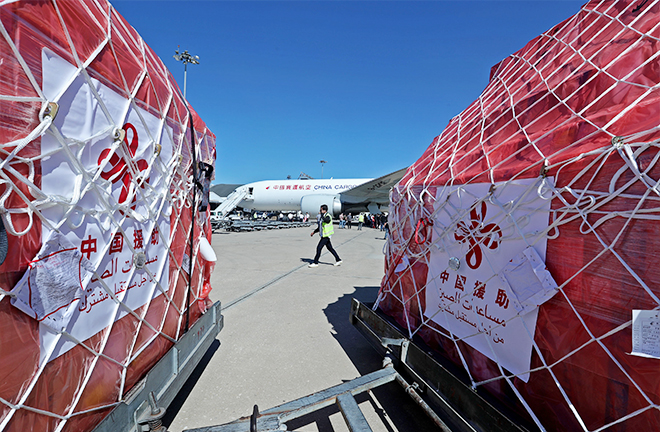Major countries expected to assume bigger roles

Emergency medical supplies from China arrive at Rafik Hariri International Airport in Beirut, Lebanon, on Oct. 21. Photo: XINHUA
On Oct. 24, scholars from around the world convened in Beijing for the Global Strategic Dialogue 2024: Responsibilities of Major Countries Amid a Dynamic Global Landscape to examine relationships among major countries and the future of the world, global governance and responsibilities of major countries, among other topics.
Major countries matter
As humanity is again at a crossroads of history, opportunities arise alongside challenges. Zhang Yuyan, chairman of the Board of Directors of the National Institute for Global Strategy at the Chinese Academy of Social Sciences (CASS) and a CASS Member, remarked that the future of humanity depends on decisions made by people worldwide. Although the UN Charter stipulates that all states are equal regardless of the size of their territory, population, economy, and military, responsibilities should be differentiated for major and lesser nations when it comes to global issues. This principle underpins the conference’s focus on relationships among major countries and the responsibilities they should shoulder.
Regarding the responsibilities of major countries in global governance, Mwangi Wachira, former World Bank economist and advisor to the Kenyan government, noted that from the perspective of Africa, peace is the largest public good major countries can offer—a need underscored by the COVID-19 pandemic and the Russia-Ukraine conflict.
In the fight against the pandemic, Africa relied more heavily than any other region on multilateral cooperation to obtain vaccines and medical supplies. Meanwhile, disruptions to global value chains and rising food prices caused by the Russia-Ukraine conflict pose serious threats to the continent’s development achievements, Wachira said.
Therefore, a functioning multilateral system is critical to Africa, Wachira asserted, calling on major countries to exercise restraint and prioritize global coordinative actions. Africa cannot become a battlefield for strategic interaction among major countries, otherwise the Cold War, which undermined modernization in Africa, will be repeated, he warned.
In the context where certain major countries, particularly superpowers, continue to act unilaterally, global mechanisms should benefit small and medium-sized countries, said Bert Hofman, a senior research fellow and former director of the East Asian Institute at the National University of Singapore. The common task of countries worldwide should be to balance responsibilities within the international system and help more small and medium-sized countries pursue their legitimate interests.
Emerging world order
According to Amitav Acharya, a distinguished professor from American University and former president of the International Studies Association, since the concept of multipolarity originated in Europe in the 19th century, it has gained popularity as a framework for describing today’s world order. In a multipolar world, major countries assume major international responsibilities.
However, medium-sized countries like Brazil, Egypt, South Africa, Mexico, Indonesia, and Nigeria still play a significant role in safeguarding regional peace. In this sense, the concept of multipolarity seems obsolete and narrow, Acharya affirmed. In his opinion, a “Global Multiplex” is a more appropriate term for the emerging world order—one that integrates diverse civilizations, ideas, and rules from all nations.
Fedor Voytolovskiy, director of the Institute of World Economy and International Relations at the Russian Academy of Sciences, explained that many current global mechanisms, along with various political and economic structures, stem from the bipolar world that took shape in the early 1990s. Between 1991 and 2010, the world experienced a unipolar period, with the United States exerting dominance over politics, security, and military affairs, and subsequently bringing into being an international economic system with the United States, Europe, and Japan at the core.
However, the current landscape has changed considerably. Voytolovskiy called for an emerging polycentric world order, suggesting it could serve as a new model of globalization based on the rise of new centers of global value chains, foreign direct investment, and international trade.
Shedding light on the status quo and prospects of reform to multilateral institutions, Robert Walker, a professor emeritus of the Green Templeton College at the University of Oxford and also professor from the Jingshi Academy at Beijing Normal University, acknowledged that while the World Trade Organization (WTO) contributed to unprecedented global economic growth, it has also largely favored wealthy countries and affluent individuals.
In November 2011, the WTO initiated a new round of multilateral trade negotiations in Doha, capital of Qatar, with an agenda encompassing reducing import tariffs for agricultural products from developing countries, ensuring equal access to the global market, enhancing technical and fiscal aid, and encouraging developed countries to provide more help for developing nations. However, Walker argued that the Doha negotiations effectively collapsed in December 2015, as certain Western countries were unwilling to make the necessary concessions.
Chinese wisdom
Magozaki Ukeru, director of East Asian Community Institute and a professor from the National Defense Academy of Japan, emphasized that with the growing economic strength of the Global South, the international balance of power has shifted. Against this backdrop, many countries have opted to embrace the Five Principles of Peaceful Coexistence championed by China: mutual respect for sovereignty and territorial integrity, mutual non-aggression, noninterference in each other’s internal affairs, equality and mutual benefit, and peaceful coexistence. These principles still hold great relevance today.
“Chinese history teaches that there is no point in dividing the world into two camps with opponents and one-winner competition,” Walker told CSST. “Chinese wisdom teaches the need to listen, learn, and understand other cultures. Shared values and mutual interests can become the basis for building the consensus required to resolve global problems so as to ensure peace and common prosperity for all.”
“In the interconnected world today, countries should share responsibilities and civilizations should respect each other, thereby providing practical solutions to global challenges. This is the original intention and vision of this year’s Global Strategic Dialogue,” concluded Wang Lei, deputy director of the Institute of World Economics and Politics at CASS.
The conference was co-hosted by CASS and China Daily.
Edited by CHEN MIRONG

 PRINT
PRINT CLOSE
CLOSE